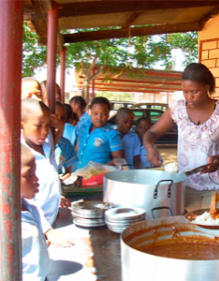|
Getting your Trinity Audio player ready...
|
 By Valencia Talane
By Valencia Talane
In part one of our series we shed some light, based on tip-offs submitted to us, on the ways in which the national school nutrition programme can be manipulated for personal gain. We turn now to explaining the rules and regulations behind the NSNP, and how it should be run.
The NSNP, an initiative of the Department of Basic Education, is built on the premise that when a community owns a process such as a school feeding scheme for the children in its schools, it takes responsibility for its success and, indirectly, for the all-round academic success of the learners. Half the battle of educating children in poor communities is won if they are assured a nutritious meal every day, to help them concentrate better on their school activities.
How does it work?
The National Treasury allocates funding for the NSNP annually in the form of a conditional grant as per the requirements of the Division of Revenue Act 2 of 2013. Provincial departments have to monitor the running of the programme in the schools under their jurisdiction, identifying areas of potential growth areas and risks in its implementation.
The funding is distributed according to each province’s needs: it is informed by how many schools are situated in poor communities within districts.
In the 2011/12 NSNP cycle, just over R4.5-million was made available to the provincial departments of education to ensure that the programme continues. Most of that money went to the KwaZulu-Natal, Eastern Cape and Limpopo education departments, which fed the most learners in the primary school category. In the secondary school category it was Limpopo, Eastern Cape and Gauteng that had the most learners benefitting.
According to DBE Minister Angie Motshekga, the programme’s budget has grown significantly over the years from R832-million in 2004 to R5-billion in 2013. The number of learners on the programme has also doubled in the same period.
Risks involved
Along with its successes in meeting the growing demands from poor communities by increasing its reach and raising its budget, the programme has also had challenges. In a recent Mail & Guardian report the Limpopo chapter of the programme came under the spotlight, following court action by rights organisation Section27 to compel the provincial department to feed learners at Tshinavhe Secondary School in the Vhembe district.
Section27 claimed to have been approached by the chairperson of the school’s governing body, who said the learners had gone without food for two months. The matter was resolved through an agreement between the organisation and the department, with the immediate restoration of the programme being the top priority.
Who benefits?
The latest available information from the department states that over 21 000 schools across the country participate in the programme. In order to be considered for participation, a school has to apply to the provincial department, detailing the number of learners in need of the service. This has to be done before the end of the current academic year for the rollout of the next year.
The district office under which a school falls participates by monitoring the programme to ensure that its outputs are met. These include the cost per learner, the quality and quantity of the meals and the distribution systems in use.
Monthly reports on these details are then handed over to the provincial department, which in turn evaluates the feedback before giving its own report to the national department. Because the programme is funded directly through the National Treasury, it is to this office that the national education department is ultimately accountable.
The department encourages schools to use funds allocated to them to grow and maintain their own vegetable gardens. In a survey conducted in over 10 000 schools, 63% indicated that they had grown their own gardens and were able to feed learners from them. Limpopo and Eastern Cape had the two highest numbers of gardens on record.
Such resources are not always a possibility and schools that are not able to grow their own gardens source the produce from private suppliers. Depending on the school’s funding category, it may either be provided with funding to source from a supplier of its choice, or that responsibility could fall with the district office.
Parents may also be roped in on a voluntary basis to assist with preparing the food.


